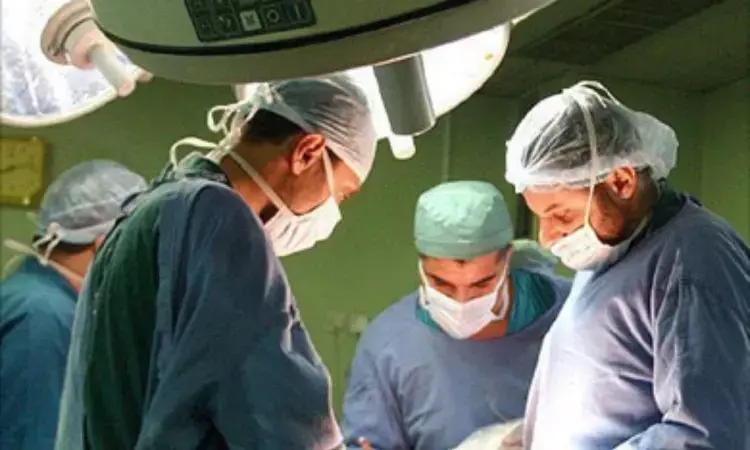- Home
- Medical news & Guidelines
- Anesthesiology
- Cardiology and CTVS
- Critical Care
- Dentistry
- Dermatology
- Diabetes and Endocrinology
- ENT
- Gastroenterology
- Medicine
- Nephrology
- Neurology
- Obstretics-Gynaecology
- Oncology
- Ophthalmology
- Orthopaedics
- Pediatrics-Neonatology
- Psychiatry
- Pulmonology
- Radiology
- Surgery
- Urology
- Laboratory Medicine
- Diet
- Nursing
- Paramedical
- Physiotherapy
- Health news
- Fact Check
- Bone Health Fact Check
- Brain Health Fact Check
- Cancer Related Fact Check
- Child Care Fact Check
- Dental and oral health fact check
- Diabetes and metabolic health fact check
- Diet and Nutrition Fact Check
- Eye and ENT Care Fact Check
- Fitness fact check
- Gut health fact check
- Heart health fact check
- Kidney health fact check
- Medical education fact check
- Men's health fact check
- Respiratory fact check
- Skin and hair care fact check
- Vaccine and Immunization fact check
- Women's health fact check
- AYUSH
- State News
- Andaman and Nicobar Islands
- Andhra Pradesh
- Arunachal Pradesh
- Assam
- Bihar
- Chandigarh
- Chattisgarh
- Dadra and Nagar Haveli
- Daman and Diu
- Delhi
- Goa
- Gujarat
- Haryana
- Himachal Pradesh
- Jammu & Kashmir
- Jharkhand
- Karnataka
- Kerala
- Ladakh
- Lakshadweep
- Madhya Pradesh
- Maharashtra
- Manipur
- Meghalaya
- Mizoram
- Nagaland
- Odisha
- Puducherry
- Punjab
- Rajasthan
- Sikkim
- Tamil Nadu
- Telangana
- Tripura
- Uttar Pradesh
- Uttrakhand
- West Bengal
- Medical Education
- Industry
Concomitant repair of urethral fistula and meatal stenosis does not increase fistula recurrence risk: Study

Tel-Aviv, Israel: A recent study published in the journal Urology has suggested that the presence and repair of meatal stenosis do not seem to affect the recurrence rate of urethrocutaneous fistulas repaired concomitantly after hypospadias repair.
Fistula formation and meatal stenosis are two of the most common complications of hypospadias repair. Hypospadias severity is the main predictor for the need for revision surgery, complications, and hypospadias repair. In the study, Yuval Bar-Yosef, Tel-Aviv University, Tel-Aviv, Israel, and colleagues aimed to evaluate whether concomitant treatment of meatal stenosis with urethral fistula repair alters the results of fistula closure in a retrospective cohort study.
The study included all children who underwent local fistula closure following hypospadias repair between 2006–2017. Those who underwent reoperative urethroplasty were not included. Researchers extracted data from electronic records and missing data were supplied by telephone interview. They also compared the characteristics of patients and fistulas between children who underwent fistula closure only and those who underwent meatoplasty for meatal stenosis during the same surgery. The primary endpoint was fistula recurrence.
Following were the study's key findings:
· In total, 106 local repairs of urethrocutaneous fistulas were performed during the study period, and 25 of them included concomitant meatoplasty for meatal stenosis.
· There was no difference in terms of location, size, and the number of fistulas or the number of recurrent fistulas between the 81 patients who underwent fistula closure only and the 25 who underwent concomitant meatoplasty.
· The fistula recurrence rate was 17/81 (21%) for the fistula-only group and 5/25 (20%) for the fistula and meatoplasty group after a median follow-up of 7 and 8 years, respectively.
· Meatoplasty was required in a subsequent procedure in 5/81 in the former group vs. 3/25 patients in the latter group.
Based on the results, the researchers concluded that concomitant repair of meatal stenosis and urethral fistula does not increase the risk of fistula recurrence post-hypospadias surgery.
Reference:
The study titled, "Concomitant repair of meatal stenosis and urethral fistula does not increase the risk of fistula recurrence post-hypospadias surgery," was published in the journal Urology.
Dr Kamal Kant Kohli-MBBS, DTCD- a chest specialist with more than 30 years of practice and a flair for writing clinical articles, Dr Kamal Kant Kohli joined Medical Dialogues as a Chief Editor of Medical News. Besides writing articles, as an editor, he proofreads and verifies all the medical content published on Medical Dialogues including those coming from journals, studies,medical conferences,guidelines etc. Email: drkohli@medicaldialogues.in. Contact no. 011-43720751


